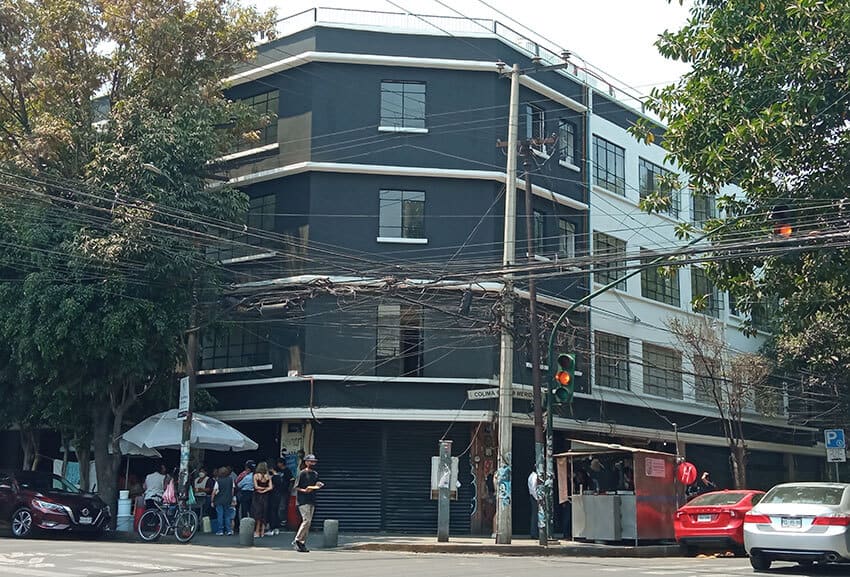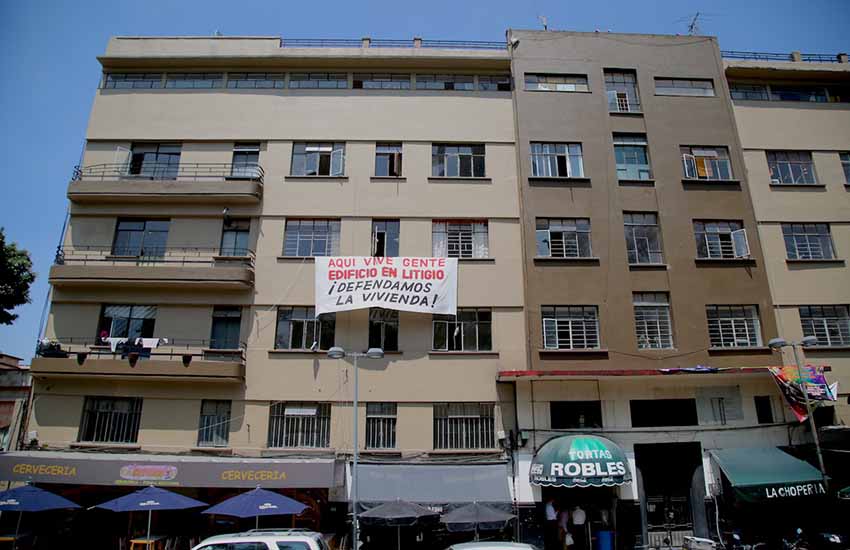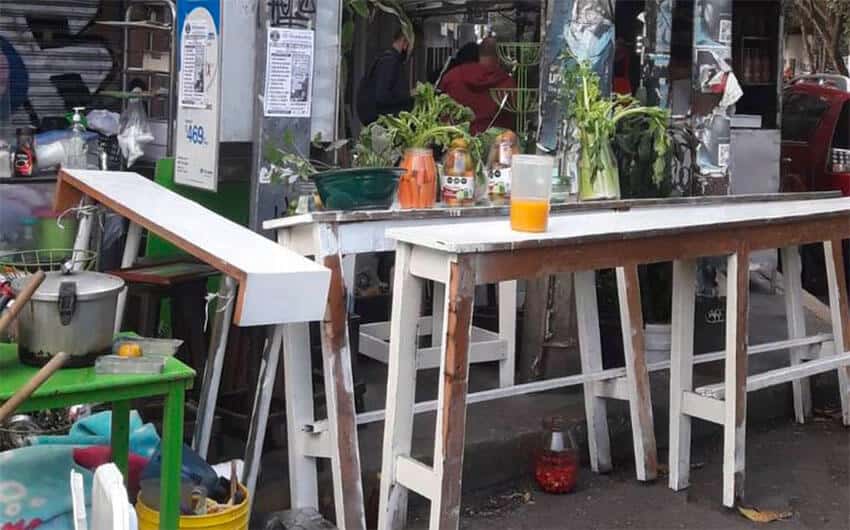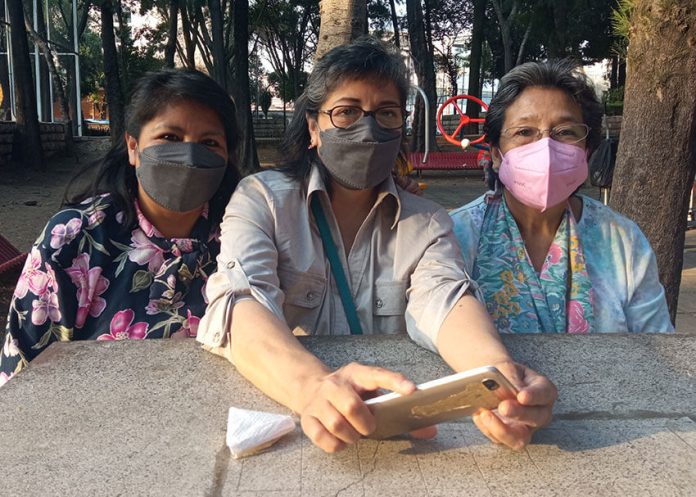“It was always about money, never about the law,” said Noemí Ortíz of her family’s forcible removal in February from their decades-old business in Mexico City’s Roma Norte neighborhood. “Fifty-four years of our life in that place, and that was the end of it.”
Since 1968, a storefront on the ground floor of Mérida #83, a large old residential building on the corner of Colima and Mérida streets, had been the home of the Ortíz family torta sandwich business, Tortería Colima, run for the last two decades by Noemí and her four siblings after their father acquired it to run a bakery in the early days.
This came to an abrupt end on February 11 when the family was removed against its will by agents of a property law firm that had been fighting to take possession of the building for some 12 years and now lists Mérida #83 as its address.
How this was able to happen is a more complicated story for a different article, but suffice it to say that the motivation for forcing the Ortíz family out of a location they’d occupied for half a century was likely the skyrocketing demand for rental properties and commercial spaces in Mexico City’s most desirable neighborhoods.
Merida #83 currently appears to be under renovation to create apartments. In Roma Norte, monthly rents for a two-bedroom apartment average around 21,150 pesos, according to the real estate platform propiedades.com.

Tortería Colima, which sold tortas and fresh juices, was an institution in the area, feeding visitors and passersby as well as neighbors and workers at local restaurants, hospitals and schools. Ortíz told Mexico News Daily that their most regular clients were waitstaff, cleaners and other workers on their lunch breaks or on their way home from a shift.
According to Observatorio 06000, an action group concerned with evictions and decreasing affordability of housing in the city center, Tortería Colima had been “one of those little corners of the neighborhood that remained standing despite the gentrification and ‘touristification’ of the area.” To be sure, the Ortíz family members were among the last remaining occupants of the four-story building, which contains 21 apartments and several storefronts.
The family said that over the years, the property law firm had deployed numerous legal challenges, as well as forms of physical harassment, to force them and other tenants out — including drilling holes into the walls and letting water run out. In response, the family behind the much-loved tortería got organized.
They hired lawyers at a cost of thousands of pesos and joined forces with tenants’ action groups in the city such as Observatorio 06000 and the Red de Desalojos (The Evictions Network).
In 2019, they held a giveaway of tortas “in defense of the neighborhood,” gifting free tortas to passersby, sharing the story of their long history in the building and their struggle to stay. They gathered hundreds of signatures from neighbors in the area on a petition expressing support for having the business remain.

According to Ortíz, the community support was palpable. “They did not want us to leave,” she said.
But in the end, all that organized resistance and community goodwill seemed to come to nothing: a group of men and women descended on Tortería Colima on February 11, throwing the business’ bar stools, milkshake makers and crockery out into the street. The aggressors physically attacked members of the family — punchingn and hitting and grabbing the women by the hair, Ortíz recounted — while others welded the doors of the store shut.
“My niece, Isabel, received multiple blows,” she said. “She had bruises on her body.”
The Ortíz family’s dislodgement is not an isolated case in Mexico City, where public debate about families forced to move during the pandemic and the increase in both construction projects and living costs has been particularly aflame lately.
Never a cheap city in which to live, the capital has been, however, experiencing a property affordability crisis.
According to a study conducted by the Autonomous University of Mexico (UNAM)’s Institute of Social Research and the Habitat International Coalition, some 55% of households throughout the city were struggling to pay their rent or mortgage since the pandemic arrived in 2020, leading 30% to change their place of residence. And in the last several months, rent prices that were frozen or that fell in 2021 are now climbing back up, with monthly increases recorded at 0.3% in 2022 according to the real estate platform Inmuebles24.
The newspaper El Sol de México reported last month that judicially permitted evictions of those who inhabited or commercially rented real estate in Mexico City increased 27% from 2020 to 2021. But that eviction data only includes formal rental contracts.

Habitat International Coalition’s Silvia Emanuelli told the newspaper that about 51% of rentals in the city are informal and these sorts of arrangements often do not involve legal proceedings when eviction becomes an issue.
So, to understand what’s really happening, it is also necessary to consider anecdotal evidence — like the story of the Ortíz family.
While it’s unlikely to be the only factor driving rising rents and evictions in areas like Roma Norte, there is one related phenomenon that currently is getting a lot of attention from Mexico City locals: the highly visible recent uptick in long-term visitors and new residents from the United States.
As housing costs in cities like New York and Los Angeles have climbed astronomically and more companies are permitting their employees to work remotely, “gringos with laptops” have become a dominant feature of street life in Roma and surrounding neighborhoods.
The street occupied by Tortería Colima for the past five decades is no exception, hosting a growing presence of fancy cafes, pop-up fashion stores and art galleries to serve a U.S.-dollar-earning clientele that stays in Airbnb apartments priced well above what the average local resident can afford.
“Gringos with laptops” have become a visible phenomenon in some of the capital’s central neighborhoods, sparking ire and debate.#EnContexto | ¿Quiénes son los responsables de la gentrificación en la Ciudad de México? ¿Los gringos con laptops? ¿O los empresarios que van detrás del dinero de la especulación?
Por @Maria_Efemerehttps://t.co/u5kLciBWmN— Pie de Página (@PdPagina) March 27, 2022
Social media has registered Mexico City residents’ criticism and frustration with this phenomenon. The visible domination of central capital neighborhoods by these digital nomads, the loose migration controls on U.S. citizens in Mexico and these newcomers’ ability to earn dollars and spend pesos is difficult for many chilangos to overlook.
When a visitor from Austin recently tweeted that remote working in Mexico City “is truly magical,” a storm of indignation among Mexico City residents about remote workers from the U.S. pushing locals out of their own neighborhoods ensued online. Referring to the dislodgement of Tortería Colima, Mexico City editor Brenda Mireles put it this way:
“Yes, come and see the magic of illegal evictions caused by the massive arrival of foreigners who impose their way of life at the expense of the original residents,” she said. “A marvel that cannot be missed!”
Ortíz agrees that the predominance of higher-income foreigners in the Roma Norte neighborhood — many from the U.S., Argentina, and France — is related to pressure on lower-income residents, but she does not blame them directly.
The trouble, she said, comes “from those who want more money, who already have the money to pay lawyers, police, the whole system … to buy the buildings and vacate them all to remodel.”
“Give them a little manita de gato [touch-up] and sell them at the price that foreigners can buy,” she explained.
One Twitter user’s rebuttal to the infamous tweet in February about remote work in Mexico City that went viral.Do yourself a favor and remote work in Mexico City — it is truly magical ✨ pic.twitter.com/Q7clRcJzx2
— ioaan (@ioaan) February 17, 2022
Indeed, that’s the central proposition of a new documentary film called PUSH, which opened in Mexico in March: that the blame for residents around the world being pushed out of their neighborhoods must be directed at the investment companies and private equity funds that have turned housing everywhere into a commodity to trade and profit from.
“It’s an elusive-by-design global system that has turned people’s homes into abstract financial assets traded on the stock market — moneymaking machines for the already more than wealthy,” wrote the documentary’s filmmaker, Fredrik Gertten, in The Washington Post Español op-ed coauthored with the film’s protagonist, housing advocate Leilani Farha.
“The main culprit behind the housing crisis in Mexico,” the pair wrote, “… is not someone on Twitter sipping a cortado in between a yoga class and the next Zoom meeting.”
Regardless of the analysis, the outcome of Mexico City’s affordability crisis — marked by financialization and speculation and the replacement of lower income communities by higher income ones — has been devastating for individuals and families like Ortíz and her siblings.
Along with a traumatic uprooting of two generations of work and community connection, they have lost their livelihood.
“We can’t go and set up in Roma again; we cannot afford to rent anywhere there,” she said. “We do not know what we will do. There are very few jobs for older people [like us].”
“We are not asking for a lot,” she said. “It’s not just that we want to live where we work. More than anything, what we want is to work — we are used to working.”
And the Roma Norte community has lost too, she argues.
“Our tortas were healthy,” she said, “and they cost less than at the street stalls. People could rely on us selling exactly the same good food that we made for our family.”
Mexico News Daily
